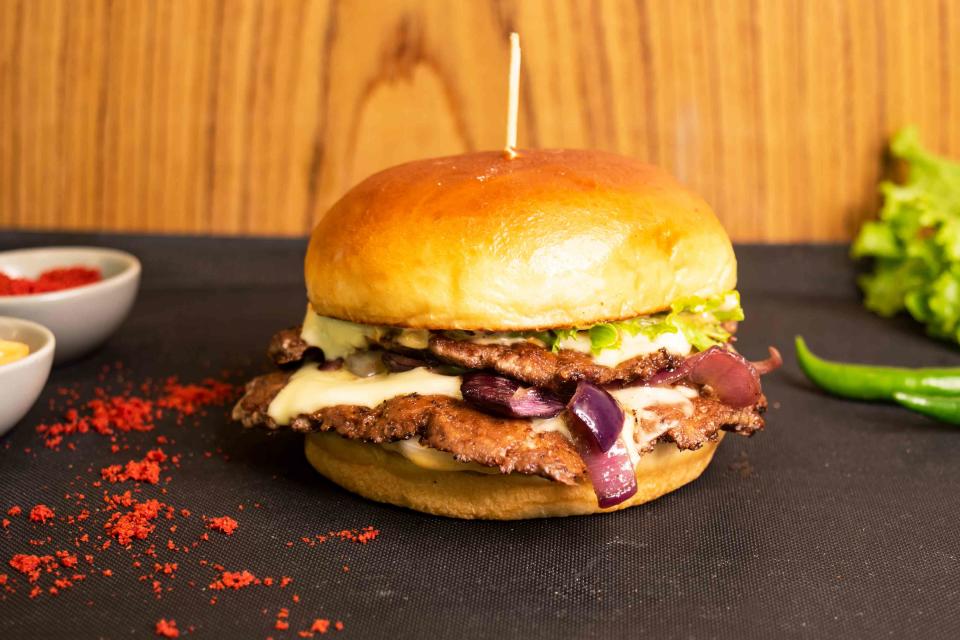What's the Definition of 'Chef's Kiss?' Merriam-Webster Has the Answer
“Make me a smashburger, cheffy!”

Waqar Hussain / Getty Images
It’s that time of year again when the word world is abuzz with the announcement of Merriam-Webster’s new dictionary additions. This year, 690 fresh words and definitions made the cut, including “doggo,” “jorts,”(shorts made of denim or jean), and “beast mode,” (an extremely aggressive or energetic style or manner that someone adopts temporarily). The list even includes some food-related terms like “cheffy” and “smashburger,” which, frankly, we think everyone should know about immediately.
Although these newcomers are chosen based on their demonstration of “widespread use over time and offer a window into the world today,” according to Merriam-Webster’s recent announcement, we can’t help but think the culinary newbies were at least a little inspired by the hit show The Bear and fast-food restaurants that have been slinging the thin-pressed hamburger patties into a griddle, like the namesake business, Smashburger.
How do the folks at Merriam-Webster select the new words anyway? “A word gets into a dictionary when it is used by many people who all agree that it means the same thing,” the Merriam-Webster site states. It’s not quite as simple as that, though; according to an article published on the website detailing this burning topic, it’s a multi-step process involving citation collections into a database and intense research where three main criteria are investigated: “frequent use, widespread use, and meaningful use.”
Related: Cook Your Way Through the Food in 'The Bear,' From Italian Beef to Focaccia
Merriam-Webster also makes another solid point that some of the seemingly “new” or “slang” words already appear in the dictionary, just in their original form. “New words like hashtag and selfie get a lot of attention, but many of the new words we add are new meanings of words that are already staples in our language: think of the recent meanings of mouse and cookie that have nothing to do with rodents or baked goods.”
The food-centric words now gracing the pages of the Merriam-Webster dictionary include:
zhuzh (noun): a small improvement, adjustment, or addition that completes the overall look, taste, etc. of something; verb: to improve in flavor or appearance by way of a small improvement, adjustment, or addition — often used with up
chef’s kiss (noun): a gesture of satisfaction or approval made by kissing the fingertips of one hand and then spreading the fingers with an outward motion — often used interjectionally
stagiaire (noun): a usually unpaid intern working in a professional kitchen as part of their training to become a chef: a cook who is doing a stage
stage (noun) 1: a usually unpaid internship in a professional kitchen that is part of a chef's training 2: a person who holds such an internship: stagiaire
cheffy (adjective): characteristic of or befitting a professional chef (as in showiness, complexity, or exoticness)
emping (noun): a slightly bitter cracker or chip popular in Indonesia that is made from the dried flattened seed of a melinjo tree (Gnetum gnemon)
jollof rice (noun): a West African dish of rice cooked in a sauce of tomatoes and onions seasoned usually with garlic, thyme, hot pepper, and other spices and often accompanied by meat, fish, or vegetables
smashburger (noun) 1: a hamburger patty that is pressed thin onto a heated pan or griddle at the start of cooking; also: a patty (as of beans or ground turkey) prepared similarly 2: a sandwich featuring one or more such patties
Other new additions that can easily be used in describing things in the culinary world include:
bussin’ (adjective) African American English slang: extremely good: excellent; especially: delicious, tasty
mid (adjective) 2 informal: neither very good nor very bad: so-so, meh
’grammable (adjective): suitable to be posted on the Instagram photo-sharing service: Instagrammable
“We’re very excited by this new batch of words,” says Peter Sokolowski, Editor at Large at Merriam-Webster. “We hope there is as much insight and satisfaction in reading them as we got from defining them.”
It’s possible to view a larger sampling of the 690 fresh terms on Merriam-Webster’s announcement page, in addition to example sentences like “They make both white and black truffle butter, and I love to use it … as a final zhuzh in a risotto or soup” that Merriam Webster provided for “zhuzh.” For the full, almost 700 words, you’ll have to scour the sparkling new version of the publisher’s famous dictionary.
For more Food & Wine news, make sure to sign up for our newsletter!
Read the original article on Food & Wine.

